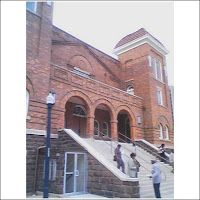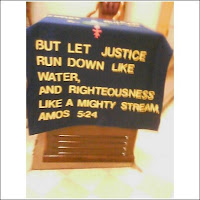 Today was the first of two Sundays Ginger and I get to share together between her pastorates, if you will. Next Sunday – the first Sunday in Advent – she will lead worship for the first time in Durham as the pastor at Pilgrim UCC. I will admit to leaning toward going nowhere to church this morning other than to a coffee shop to hang out with the woman I love, but I asked her anway.
Today was the first of two Sundays Ginger and I get to share together between her pastorates, if you will. Next Sunday – the first Sunday in Advent – she will lead worship for the first time in Durham as the pastor at Pilgrim UCC. I will admit to leaning toward going nowhere to church this morning other than to a coffee shop to hang out with the woman I love, but I asked her anway.
“I thought we might go to Sixteenth Street in the morning,” she said.
On April 16, 1963, Rev. Martin Luther King, Jr. made public his “Letter from the Birmingham Jail,” in which he articulately and incisively called the white church leaders of Birmingham to take seriously God’s call to equality, justice, and compassion:
There was a time when the church was very powerful in the time when the early Christians rejoiced at being deemed worthy to suffer for what they believed. In those days the church was not merely a thermometer that recorded the ideas and principles of popular opinion; it was a thermostat that transformed the mores of society . . . Things are different now. So often the contemporary church is a weak, ineffectual voice with an uncertain sound. So often it is an archdefender of the status quo. Far from being disturbed by the presence of the church, the power structure of the average community is consoled by the church’s silent and often even vocal sanction of things as they are.
But the judgment of God is upon the church as never before. If today’s church does not recapture the sacrificial spirit of the early church, it will lose its authenticity, forfeit the loyalty of millions, and be dismissed as an irrelevant social club with no meaning for the twentieth century. Every day I meet young people whose disappointment with the church has turned into outright disgust . . . [p]erhaps I must turn my faith to the inner spiritual church, the church within the church, as the true ekklesia and the hope of the world. But again I am thankful to God that some noble souls from the ranks of organized religion have broken loose from the paralyzing chains of conformity and joined us as active partners in the struggle for freedom . . . [t]hey have gone down the highways of the South on tortuous rides for freedom. Yes, they have gone to jail with us. Some have been dismissed from their churches, have lost the support of their bishops and fellow ministers. But they have acted in the faith that right defeated is stronger than evil triumphant. Their witness has been the spiritual salt that has preserved the true meaning of the gospel in these troubled times. They have carved a tunnel of hope through the dark mountain of disappointment.
On May 9, 1963, Ginger was born in Birmingham just down the street from where Dr. King was incarcerated. Her parents drove through the demonstrators and the police officers to get to the hospital. This stuff is in her DNA.
Sixteenth Street Baptist Church stands not far from the jail and the hospital. On September 15, 1963, the church was bombed by people who would be called “terrorists” in today’s parlance, ripping holes in the side of the church and killing four little girls. Today, November 18, 2007, we sat among the other worshippers in that room that is more than an historical site; it is a church. We sat down and were immediately welcomed by the woman who sat behind us, as well as by a number of folks who got up from their seats and crossed the sanctuary to say hello. The service began with choruses, and then we sang,
this is my story, this is my song
praising my savior all the day long
As the pastor stood to voice prayer requests, he mentioned the family of Rev. John Cross, Jr. who was the pastor in 1963 and who died last Thursday. The pastor spoke of Cross’ decision to respond to King’s challenge and make Sixteenth Street a rallying point for the Civil Rights Movement, which, he said, “was almost like a death sentence.”
As he sat down, the youth choir sang,
when the spirit of the Lord comes upon my heart,
I will dance like David danced,
I will pray like David prayed,
I will sing like David sang
Then the pastor rose to read the scripture passage for the day: Isaiah 6:1-8 —
In the year that King Uzziah died I saw the Lord sitting upon a throne, high and lifted up; and the train of his robe filled the temple. Above him stood the seraphim. Each had six wings: with two he covered his face, and with two he covered his feet, and with two he flew. And one called to another and said: “Holy, holy, holy is the LORD of hosts; the whole earth is full of his glory!” And the foundations of the thresholds shook at the voice of him who called, and the house was filled with smoke. And I said: “Woe is me! For I am lost; for I am a man of unclean lips, and I dwell in the midst of a people of unclean lips; for my eyes have seen the King, the LORD of hosts!”
Then one of the seraphim flew to me, having in his hand a burning coal that he had taken with tongs from the altar. And he touched my mouth and said: “Behold, this has touched your lips; your guilt is taken away, and your sin atoned for.” And I heard the voice of the Lord saying, “Whom shall I send, and who will go for us?” Then I said, “Here am I! Send me.”
The pastor began to theologically and theatrically dissect the passage, masterfully stating the obvious message in compelling fashion:
If birds can sing for God; if fish can swim for God; if stars can twinkle for God; and the sun can shine for God; shouldn’t we be doing something to the glory of God?
Forty-four years after those little girls were killed, the bomb still leaves a mark. Ginger went downstairs to find the bathroom and realized she was in the part of the building where the little girls were when the bomb exploded. When I saw the pictures of the small memorial nook, I realized where we were standing in the sanctuary when we met the pastor after the service was underneath the window that was blown out. Four decades later, what exists on that site is not a mega-church, nor is it a museum. It is a group of Christians coming together to live out their faith in these days, carrying both the weight of memory and the hope of the future.
“I’m tired of coming to church to come to church,” he said at one point in his sermon. “I’m tired of people coming to church to find the errors in the bulletin or to catch up on the gossip. We come to church to experience and encounter God. Before we can serve God, we have to see God.”
The vision of God that speaks most profoundly to me is an incarnational one. Along side the story of Jesus, I see God in Doug who stayed late to pack (and all the others whose fingerprints are all over our boxes), in Dawn who told me I was overwhelmed and just needed to get out of town and leave all the trash in our house for her to clean up, in the painful compassion I see in Ginger as she cares for her father and his Alzheimer’s, in the woman who was effusive in her welcome to us as we entered the sanctuary this morning, in the little kids who danced and squirmed as they sang in the service:
showers of blessing
showers of blessing
overflowing down in my soul
there are so many blessings
I can’t count every one
Lord, I bless you
Lord, I praise you
for what you’ve done
As many times as I’ve heard the Isaiah passage, I think I’ve mostly heard God’s question and Isaiah’s response as having to do with duty: here is the task at hand; who is going to do the work? But as we wallowed in glory and gratitude this morning, sitting among the scars in that old church building, I got a glimpse of a God who calls us not to do our duty, but to respond to our destiny. Had those four little girls lived, they would be in their fifties, like me, or maybe a little older. They might have been the women who welcomed us so warmly this morning. Their grandchildren might have been singing in the choir today. They are not here, but I am.
I am. We are.
I offer yet another one of the voices that has been a part of the soundtrack for my sojourn, Pierce Pettis:
well I’m up and down
and I’m left and right
rich and poor
black and white
I am not alone
I am not ashamed
to make my home
in a state of grace
In this week without an address, where else can I call home except the intersection of God’s call and our response to incarnate the love and grace we’ve been given. Wherever the mail is ultimately delivered, this is where I need to live.
*the banner was hanging in the basement of the church.

That brings back memories. I lived in Birmingham for 15 years before moving to Denver.
If you’ve never been, the Civil Rights Musuem there is worth a look. Really well done.
Enjoy some sweet tea for me.
May you always live in a state of grace regardless of the street address. Blessings to you and Ginger on your journey and creating a new home.
To see Christ in others is a great encouragement and a huge blessing.
It’s also our calling. An easy task to comprehend, but hard to fulfil. May God strengthen us.
Thanks you for the post – a blessing in itself.
Thank you for this. I always wondered where Ginger got that passion. It really is in her DNA.
I also like that the church is just a church. Not a museum or historical marker of some sort. Maybe I’ll get to visit someday.
I love how the pastor made his point and realize he said much what I wanted to say yesterday, but so much more directly.
Your blog reminds me of what God meant to the children in my school after reading them a Thanksgiving story the other day..One four year old said, “I”m thankful that we have enough money to share with others who don’t”…Another four year old said, “I’m thankful that we have enough food and toys to share with those who don’t”…and the third one said, (Sam Will) “I’m thankful for God”. I guess I underestimated these young children. God is good.
Thank-you. I’m a Canadian, and our Thanksgiving came and went in a flurry 6 weeks ago. Today, it was refreshing to my soul to come and read your thoughtful post- I was rapidly tiring of flippant ‘Turkey Day’ comments.
I awoke one morning earlier this week with “Holy, holy, holy, is the Lord God almighty” resounding in my mind. I am thankful.